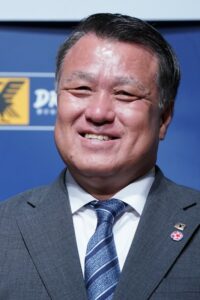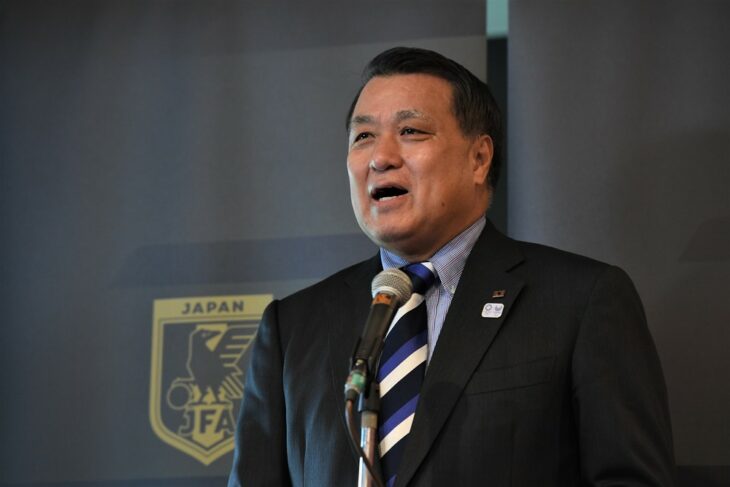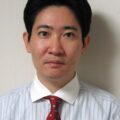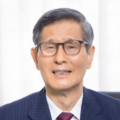The President of the Japan Football Association’s battle with the coronavirus, his recovery and the future: I won’t give in to the virus, and neither will football or the Olympics!
Tashima Kohzo, President, Japan Football Association (JFA) and Vice President,
Japanese Olympic Committee (JOC)
A message from someone who has experienced the coronavirus
―During the second half of March, it was announced that you had contracted the new coronavirus, deeply shocking the Japanese public.

Tashima Kohzo, President of JFA and Vice President of JOC
PHOTO: JFA
Tashima Kohzo: Thinking about it now, I probably caught the virus in Europe. During the second half of February, I attended an international meeting in Belfast, UK. That coincided with an important meeting in Amsterdam in the Netherlands to promote our bid for the 2023 FIFA Women’s World Cup, in which rival countries would make presentations. We were also given the chance to make a presentation, so canceling was not an option. Looking back, Europe at that time was completely different to the situation now. No one was wearing a mask on the street and people were casually shaking hands and hugging. When I was hugged by people I knew, I felt slightly uneasy and wondered if it was OK, but I didn’t refuse. During the overseas trip, I and three other Japanese people who accompanied me always made sure to disinfect our hands before eating. We also gargled and washed our hands back at our rooms. At that time, I think we were more cautious than European people. After that I traveled to the United States to watch the Japan women’s team play a match, before returning home on March 8. Thinking back, the bars in New York were packed. They really were perfect “3Cs” environments [closed spaces, crowded places and close-contact settings].
Meanwhile, just before I left for that business trip on February 26, the JFA started working from home. That was because the situation in Wuhan, China had become serious and people were getting very worried. I’d never teleworked before and, to be honest, I was a bit confused by online meetings. I always thought meetings meant seeing people face-to-face. But when we considered the threat from the new coronavirus, we decided that it would be better to switch to working from home early on. Afterwards, that turned out to be the right decision.
―How did you discover you had contracted the virus?
Tashima: Right after I returned to Japan on March 8, infections suddenly spread across Europe and borders were closed; and in the United States, restrictions were put on people leaving their homes. I was completely surprised by these drastic changes. As for myself, the JFA had already set up telecommuting so I didn’t meet anyone and my physical condition hadn’t changed.
Six days after returning to Japan, I took part in an Executive Committee meeting at the office.. After the meeting I felt a little tired and shivery, so I decided to go to bed early. But when I checked the internet news from my bedroom and saw that the chairman of the Serbia Football Association had caught the coronavirus, I thought, “Wait a second. I was there too.” Straight away, I consulted my wife (Dr. Dohi Michiko of the Japan Institute of Sports Sciences), who is a doctor, by cellphone in another part of our house. She disinfected doorknobs and everything else I had touched and made it possible for me to self-isolate in my room. We organized movement in the house so that I wouldn’t come into direct contact with other family members. The following day I had a slight temperature of 37.5 degrees so I called the health care center to tell them that someone with whom I’d attended a meeting had developed coronavirus symptoms. I was tested at a designated specialist hospital, the result was positive, and I was admitted there and then.
The doctor used a stethoscope and diagnosed me with pneumonia but I was surprised because I’d had no difficulty breathing or similar symptoms. What I mean to say is that, if my temperature had gone down when I was at home, I probably wouldn’t have got tested, kept on moving around and infected someone else.
―How did you feel staying in hospital?
Tashima: My only feelings were to pray that the JFA wouldn’t become a coronavirus cluster and other members of my overseas travel group wouldn’t turn out to have caught the coronavirus. More than worrying about my own health, I was extremely concerned that I might have passed the virus on to others. The silver lining was that no-else at the association or who had traveled with me turned out to have caught it.
As of the end of March, nobody in Japan had been publicly named as having caught the coronavirus, but since I had the official role of JFA president I decided my name should be made public. I had no hesitation, although of course I gained my family’s consent first. I thought it could be a warning message about contracting the virus.
―Were your family tested too?
Tashima: When I caught the virus, we were in the middle of the “cluster measures.” It was predicted that if the number of tests simply increased, beds would be filled up with those who had tested positive and some serious cases would not be able to receive treatment. My wife didn’t have a temperature or other symptoms so she spent two weeks self-isolating without being tested.
Afterwards, measures were taken to move those with no symptoms or mild ones to hotels and other facilities. In other words, the situation changed. It seems that once worries about beds running out have disappeared, even considering things from an epidemiological perspective, we should increase the number of tests. I think the way of testing changes according to the situation.
I witnessed the extremely tough work done by health center staff. In my case, I had been in close proximity to almost twenty people. But in other people’s cases that was as many as 100. The work of contacting those people one by one then carefully explaining how to deal with the situation is a lot of work. I was deeply impressed by that careful and precise work. We shouldn’t make people working in medical facilities any more exhausted than necessary. In the medical facilities, there was a shortage of protective clothing and masks, but we should have learned the importance of preventing infection within hospitals from China and Europe where the virus had already spread and health systems had collapsed. Why did Japan behave like a child avoiding their homework and not immediately take measures? I saw what happened firsthand, so I want to emphasize that.
And as someone directly involved, there is something else I want to emphasize. It is natural to feel scared about an unknown virus. Even I might test positive for the virus again. People who made deliveries to our house would silently place them outside the front door. That was because they didn’t want to have “contact” with us. I recognize that such feelings are natural, but I’d like people to imagine medical workers and other staff within the medical system who do their utmost to deal with patients while carrying the personal risk of infection. I’d like Japanese people to be more respectful, grateful, and supportive of them. In Europe, I saw how people clapped at 8 pm for health workers. I’d like people in Japan to also work to show support for our health facilities. We must not exhaust our health facilities and we must not cause their collapse. Of course, discrimination towards health workers or their families is totally unacceptable.
Players offered to return their salary
―Japanese players at European clubs, Yoshida Maya, Shibasaki Gaku and Kagawa Shinji, started to send video messages to Japan, didn’t they?
Tashima: Japanese players got a direct sense of the crisis around the middle of March when they saw the situation in Italy and Spain becoming dangerous, how people around them, including players, were becoming infected, and how towns were being locked down one by one. They made and shared “stay at home” video messages in their own words advising to “do all you can indoors” and “wash your hands.” The JFA National Teams and Youth Development Department compiled the videos and uploaded them to JFA-TV as a way to spread the message even further.
I think something behind them moving into action by themselves so quickly was European football clubs and their traditions. They have deep ties to their local areas, are an important presence with much influence, and are respected. So, information that they give out spreads quickly. You can see their players actively contribute to society on a daily basis. Japanese players abroad had seen that happening firsthand, so they moved into action quickly.
―In Japan, players from the J-League team Hokkaido Consadole Sapporo volunteered an approximately 100 million yen pay cut to help their club continue. It was reported as the first time in the Japan professional sports world that players themselves had returned their salaries, wasn’t it?
Tashima: Hokkaido Consadole Sapporo is kind of like a local football team. If they were backed by a big company, perhaps they could hope to withstand the coronavirus crisis. But local football teams don’t have spare financial resources, so I think indefinite cancellation of official fixtures due to the spread of the virus must have made them extremely worried. Before that, players in Barcelona, Spain, announced their intention to take cuts of over 70% of their basic salaries and distribute that to the salaries of club staff. I think that happening also had an effect.
―What kind of future support measures is the JFA considering?
Tashima: In the first place, I believe that the JFA exists for times of crisis like this. Not just the Japan National Team and the J-League, but the women’s teams, university teams, amateur teams, and the JFL… they are all facing difficulties. I would like the JFA to make effective use of the funds steadily accumulated by my predecessors to support Japanese football. The details, such as whether the scale is five billion yen or ten billion yen, are yet to be decided, but we won’t be stingy. Meanwhile, we will waive JFA registration fees and are considering halting the association contributions that apply to J-League, amateur and other teams (3% of admission income or around 600 million yen per year in total). The clubs must pay salaries to their players, coachess and staff. In any case, the important thing is to avoid redundancies as much as possible. I believe that the JFA has to work as hard as it possibly can to ensure that once things return to normal people will be able to enjoy football again.
Our only choice is to fight and be tough

Tashima Kohzo, President of JFA and Vice President of JOC (PHOTO: COURTESY OF JFA)
―With the postponement of the Tokyo Olympics, the torch relay was canceled. Its planned starting point, J-Village (the national training center for football) was at the front line of dealing with the Fukushima nuclear accident, wasn’t it?
Tashima: J-Village was chosen as the starting point for the Olympic torch relay as a symbol of the “recovery Olympics”: a way to show the world the ongoing and strong recovery from the Great East Japan Earthquake. When that happened, I was so happy that I got goosebumps. Personally, J-Village means a lot to me as the place where our youth development facility, the JFA Academy, was established. I went into hospital before the planned day of the Olympic torch relay, however, and was disappointed that I wouldn’t be able to go and see it. But then the postponement of the Olympics was decided and everything went back to square one. This is the situation, so we need to pull ourselves together and next year show how Fukushima has become even stronger. I am sure the new start point for the torch relay will be J-Village.
―In your role as Vice President of the Japanese Olympic Committee, please tell us about the challenges involved in holding the Olympics.
Tashima: All the event teams invested funds and arranged things to produce optimal performance by the summer of 2020. Now that the games have been postponed for a year, where to acquire additional funds is a major issue. The bulk of the Japan Olympic Committee’s funds come from the government, so Chairman Yamashita Yasuhiro is at the forefront of conducting negotiations with the government and sponsors to raise funds. I am also supporting Yamashita every way I can. Meanwhile, athletes face the problem of an extended period when they cannot practice or compete. We intend to carefully organize their schedules so that we don’t get into a situation where, as a negative consequence of that, they have numerous competitions in a short period of time and become exhausted.
―With the one-year postponement, there is also a debate about athletes’ right to represent their country; that is, about whether to run the selection again or not, isn’t there?
Tashima: There are different opinions about this. A selection that satisfies all athletes will probably be difficult. But precisely because we have this crisis, we need to carefully reexamine the origins of sports and of the Olympics. So far, in Japan, athletes have received close to the best support they could in a privileged environment. It was possible to achieve that because Japan is at peace, is safe and its people healthy. When we consider places like Afghanistan or the Middle East, for example, there are international conflicts and political instability. Their athletes take part in international competitions after practicing desperately hard in those environments. It is very hard to call that an “equal” process. Yet, they battle on and do their best in competition. We too must accept this dramatically changing reality, be tough, and fight hard under these newly determined conditions.
―Immediately after the Great East Japan Earthquake, Nadeshiko Japan (Japan Women’s National Team) cheered people up through things they did. What can sports do to help with the coronavirus crisis?
Tashima: The Great East Japan Earthquake really was a crisis for Japan. The spread of the virus right now is a crisis for the world. People in all countries are suffering. At the rescheduled Olympics due to be held next year, both winning and losing athletes will come with painful stories about the new coronavirus. That’s why showing how we faced and beat this crisis will be a theme of those Olympics; and that’s an issue for athletes all over the world. However, we can’t be blindly optimistic. Many things about the new coronavirus are still unknown. Japan could return to normal, for example, but if the virus is still running out of control in other countries next summer, holding the Olympics may not be possible. In any case, I’d like us to apply all our energy to doing whatever we can now.
There is also much that Japan can do in terms of physical and humanitarian support, such as developing and supplying drugs for treatment, as well as providing the latest treatment technology and medical equipment such as artificial respirators. In particular, there is now a fear that the virus will spread in regions such as Africa and South America, so Japan must contribute to global efforts.
Interview by Yamashita Yumi
Translated from “Tokushu: Datsu korona kyoko [Nihon no sentaku]—JFA kaicho no tobyo, seikan soshite kongo: Watashimo sakkamo gorinmo korona ni makenai (Feature: Departure from the Coronavirus Depression [Japan’s Choice]—The President of the Japan Football Association’s battle with the coronavirus, his recovery and the future: I won’t give in to the virus, and neither will football or the Olympics!),” Chuokoron, June 2020, pp. 64–69. (Courtesy of Chuo Koron Shinsha) [July 2020]
Keywords
- Tashima Kohzo
- Japan Football Association
- JFA
- Japanese Olympic Committee
- JOC
- coronavirus
- 3Cs
- health workers
- Hokkaido Consadole Sapporo
- Tokyo Olympics
- J-Village
- Great East Japan Earthquake
- recovery
- Japan and COVID-19




